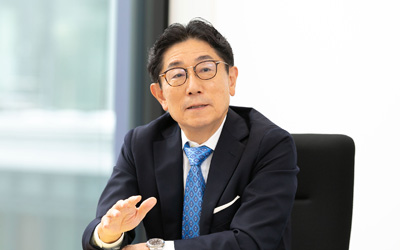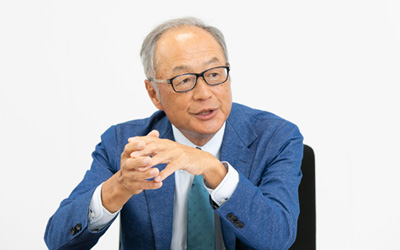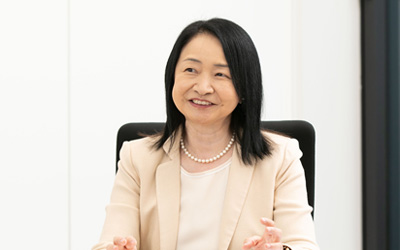Roundtable Discussion with the Outside Directors
Striving to Further TAIYO YUDEN's Governance in Step with Its Growth
TAIYO YUDEN is working to optimize its corporate governance structure in an aim to ensure sustainable growth and medium- to long-term improvements in corporate value. Outside Directors Masashi Hiraiwa, Seiichi Koike and Emiko Hamada have offered their opinions on the current state of TAIYO YUDEN's corporate governance and the results of their discussions on the change to the social value targets in the medium-term management plan 2025.
-
Masashi
HiraiwaOutside Director
-
Seiichi
KoikeOutside Director
-
Emiko
HamadaOutside Director
Current State of TAIYO YUDEN's Corporate Governance
Hiraiwa: I feel TAIYO YUDEN is incredibly sincere and honest in its corporate governance initiatives. The Company has been working promptly to adhere to Japan's revised Corporate Governance Code, and I believe it can be said that it is making solid progress strengthening its corporate governance. Discussions and deliberations are underway to find concrete ways to comply with the three main pillars of the 2021 revised Code: Enhancing Board Independence, Promoting Diversity, and Attention to Sustainability and ESG.
Koike: We have also been steadily working to address issues that have been identified in our effectiveness evaluations. Launching the Sustainability Committee, which meets to share sustainability-related issues and deliberate measures to resolve them, is one of the steps we took in response to an issue from the FY2020 evaluation. We also have five sub-committees on environmental, social and governance (ESG) concerns we have bundled underneath it, and I think they work extremely well together. The Sustainability Committee communicates what has been reported and deliberated at its meetings to the Board of Directors, so the committee's structure allows for deep, fertile discussion on essential topics. We hope to see these committees well-managed so that their efforts can take root.
Hiraiwa: The Sustainability Committee has already met several times and I feel it is off a smooth start in terms of operations, but its feedback on reports from the sub-committees is not really showing as much progress as I would like. To put it differently, sustainability is such a huge topic that the committee is not yet able to quickly set a direction for the course of action the Company should take after receiving reports. That being said, the committee has only just gotten its start, I think it is important not to rush and to look at things from a medium-term perspective.

Hamada: It is truly commendable how even though the Sustainability Committee holds such a wide range of discussions, its members are able to take personal responsibility for sustainability-related issues and discuss them in the context of work. I feel that the committee is gradually diving deeper in terms of the content of these discussions, and I hope that this will lead to further initiatives in the future.
Progress on the Medium-term Management Plan 2025
(Economic Value and Social Value)
Hiraiwa: TAIYO YUDEN's financial results for FY2021 were excellent, hitting its targets for operating income, ROE and ROIC. I think it is important that the Company continues to achieve its stated goals even in the face of change in the external environment, be it tense international affairs or the macroeconomic slowdown.
While the Company's economic value is improving, there are still challenges related to social value. I think there is a lot of work to be done to meet the Company's human resource targets in particular.
Hamada: When it comes to diversity, TAIYO YUDEN has set a goal to achieve a female manager ratio of at least 10% by FY2030 on top of its target 30% or higher rate of newly recruited female graduates. Achieving this goal is no easy task. It most certainly means having to reconsider everything from the ground up, starting with things like the evaluation system and career planning.
I also think the Company needs to develop systems that embrace a truly diverse workforce rather than focusing solely on gender. Fortunately, TAIYO YUDEN has a track record of recruiting a relatively large number of mid-career hires. I believe that TAIYO YUDEN can leverage this experience to expand hiring overseas and further increase the number of mid-career hires, or even take more drastic steps such as recruiting exceptional young personnel and offering them higher positions. Doing so will create an environment in which diverse talent can succeed, ultimately resulting in a higher rate of newly recruited female graduates and a higher female manager ratio.
Koike: I agree with Ms.Hamada's opinion that the human resources issue is not just about women participating, but a broader diversity issue, and the Company needs to encourage more foreign nationals and young people to play an active role. TAIYO YUDEN has a large number of bases overseas that have been around for over 20 years, and I think the Company needs to be bold and appoint and promote more local personnel.

Hiraiwa: One of the key themes of the medium-term management plan 2025 is tackling environmental issues, and the Company has made a major change as to the plan by revising the greenhouse gas (GHG) emissions reduction target originally set last year when the plan began. It raised the target from a 25% reduction in GHG emissions compared with FY2020 by FY2030 to a 42% reduction, stemming from the international agreement made at the 26th Conference of the Parties (COP) to the United Nations Framework Convention on Climate Change in 2021 to strive toward limiting the increase in average temperatures from pre-industrial levels to 1.5℃. This significant upward revision to catch up with global trends means that proper discussions are being held on materiality led by the Sustainability Committee, and the Company's decision-making is functioning properly in response.
Hamada: Reducing GHG emissions is an immense task that is notably difficult to achieve. Frankly, even if you look to the current global landscape surrounding energy issues for answers, there is no clear roadmap to follow to reliably reduce emissions. Under such circumstances, the Company must voluntarily set its own firm goals and work to achieve them. Doing so is not simple.
But we have seen concrete efforts getting underway on the ground, with each site and business unit conscious of what they ultimately want to achieve, like the R&D Center's decision to switch to being powered by 100% renewable energy.
We caught glimpses of some candid opinions at first saying it would be an impossible task, so it has been a pleasant surprise seeing how much has changed over the past year.
Remuneration Initiatives
Koike: I serve as chair of the Remuneration Committee, and in FY2021 we looked into a remuneration system for corporate officers consistent with the Company's corporate strategy that we then reported on to the Board of Directors. TAIYO YUDEN's previous remuneration system was well-structured in line with the Company's policy on determining remuneration, but internal and external conditions have changed since it was originally designed, so the Remuneration Committee sorted out the issues for review.
The new system maintains the 4:4:2 ratio of basic remuneration, performance-based bonus and stock compensation-type stock options while creating a system that provides incentives based on how well the medium-term management plan has been achieved. For example, we added degree of achievement against the medium-term management plan 2025 social value KPIs to the individual performance indicators for bonuses and linked a portion of stock remuneration to ROE, one of the plan's economic value KPIs.
According to an external research agency, the average ratio of basic remuneration, performance-based bonus and stock compensation-type stock options of 928 companies in Japan in FY2020 was 57:26:17. This shows that the proportion of fixed remuneration offered at TAIYO YUDEN is low.
Hiraiwa: I think the current 4:4:2 ratio is appropriate. The Company is currently in its growth stage, and I would very much like for it to be conscious of incentives as a way to improve financial results. Moreover, going forward, if the Company hopes to hire outstanding talent both in Japan and abroad to diversify its human resources, I think the higher ratio of variable remuneration will be effective.
Medium- to Long-term Initiatives Regarding the Composition and Nomination of the Board of Directors
Koike: Having a highly competent CEO is a pivotal factor in determining a company's future, and I even believe that selecting and nurturing such a CEO is the cornerstone of corporate governance. The Nomination Committee serves a very important role in that sense, though I feel there is room for further improvement in the growth situation of successors to management and in the criteria and process used to appoint the next CEO.
Hiraiwa: I chair the Nomination Committee, and as Mr. Koike said, the CEO successor plan must surely be improved. This is an issue that needs to be tackled in cooperation with the executive directors, the Committee Secretariat, and other relevant stakeholders.
Hamada: It is also important that the Nomination Committee discusses what qualities the members who make up the Board of Directors should possess. The skills matrix that has been disclosed is fit for TAIYO YUDEN as of today, but I would like to deepen the discussion on what kinds of skills and experience are needed from Directors when what the Company should become in the future is considered. This is an issue that was also raised during last fiscal year's effectiveness evaluation. I think a process needs to be established to draw out the big picture of what the Company should look like moving forward, define the skills and experience needed to make it a reality, and appoint candidates for Director who possess them.

Hiraiwa: The medium- to long-term composition of the Board of Directors was identified as an issue in the effectiveness evaluation last fiscal year. At the risk of repeating myself, the Company is currently in its growth stage, and just like how you swap out your clothes with the right size as you grow, a company's Board of Directors needs a composition that is optimal for its level of growth. Alongside factors like gender, nationality and age, diversity of experience is also key. It is important that the Company keeps that in mind as it holds repeated discussions on the skills matrix and the composition of the Board of Directors.
